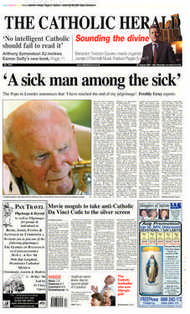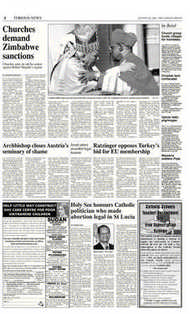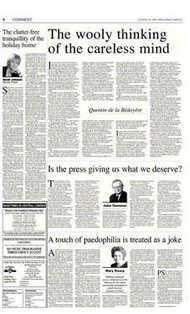Page 3, 20th August 2004
Page 3

Report an error
Noticed an error on this page?If you've noticed an error in this article please click here to report it.
Tags
Share
Related articles
Pro-lifers Push For End To Destructive Experiments
Cloning Law Under Scrutiny
Government Accused Of Deceit Over Cloning
The Catholic Herald
Leading Cloning Entrepreneur Revealed As One Of Labour...
Pro-life groups mount challenge against cloning
BY CHRISTOPHER LAMB
PRO-LIFE CAMPAIGNERS are mounting a legal challenge to stop Britain becoming the first country in the West to clone human embryos.
Opponents of cloning are horrified by the government’s decision to grant the Newcastle Centre for Life a one-year licence that will allow researchers to develop human life in the name of medical advancement.
The centre claims that cloning will help find cures for diseases such as cancer, diabetes and Parkinson’s.
But Comment on Reproductive Ethics (Core), a pro-life group, says that the experiments are scientifically dubious as well as morally abhorrent.
It is instructing lawyers to challenge the legality of the licence, granted by the Human Fertilisation and Embryology Authority (HFEA).
In a statement, the HFEA said: “This licence allows scientists to create human embryos ... the purpose of this research is to increase knowledge about the development of embryos and enable this knowledge to be applied in developing treatments for serious disease.” “This is a tragic decision, which will result in further relentless destruction of human life,” said Josephine Quintavalle of Core. “We want to take legal action to question the necessity of this action as we believe it to contravene the law set by Parliament.” The 1990 Human Fertilisation and Embryology Act only allows the use of embryos in medical research if it is “necessary” for increasing knowledge about diseases.
Anthony Ozimic, political secretary for the Society for the Protection of Unborn Children (SPUC) said that the decision both demeans and devalues life.
Mr Ozimic said: “The HFEA, which is supposed to be a regulatory body, contains passionate advocates for such cloning practices.” He added: “They are abusing their role and abusing their position.” Jim Dobbin, Catholic MP and Chairman of the Allparty Parliamentary Pro-life Group, criticised the timing of the HFEA’s decision.
He said: “To make this announcement in the middle of August when MPs are away on holiday and unable to properly scrutinise this document is typical of the contempt the HFEA hold parliament in.” Human cloning involves removing the nucleus of a human egg, replacing it with skin cells.
The egg cell then multiplies, and stem cells are thus produced. These cells can be injected back into the patient’s body, the leftover embryo destroyed.
Professor Alison Murdoch, head of the Newcastle Centre for Life, was “delighted” by the news. “A group like Core is fundamentally opposed to any kind of advances in embryonic research,” she said.
“Do they really think people should go on suffering? Ethics are not about absolutes.” Prof Murdoch claimed that a number of senior lay Catholics had written supportive emails to the Newcastle Centre, but she refused to mention any names.
The Vatican, however, has been quick to condemn developments. “The Holy Father has always unequivocally condemned all forms of human cloning, even for therapeutic purposes,” said Joaquin Navarro-Valls, the Vatican’s spokesman, Pro-life groups and the Vatican both believe that adult stem cell research is ethically and scientifically a better alternative to embryo research for finding cures for diseases.
Dr Helen Watt, director of the Linacre Centre for Health Care Ethics, a bioethical institute of the Catholic Church in England and Wales, said: “Adult stem cells are a tried and tested method in this field. Embryonic research is untried and could be dangerous as embryos are versatile and unstable; using them in treatment could cause tumours and other illnesses.” Mrs Quintavalle pointed to the example of experts in Harvard medical school who do not believe that embryonic research will provide a cure diabetes.
She said: “Alison Murdoch is living in cloud cuckoo land if she thinks this will cure major diseases. They are making false promises and irresponsibly raising people’s hopes.” As news spread throughout the world, the International Federation for Catholic Doctors said that embryo stem cell research was motivated by money, that research on adult stem cells had produced important results and diseases such as Aids, malaria and malnutrition could be effectively treated for less money.
blog comments powered by Disqus















